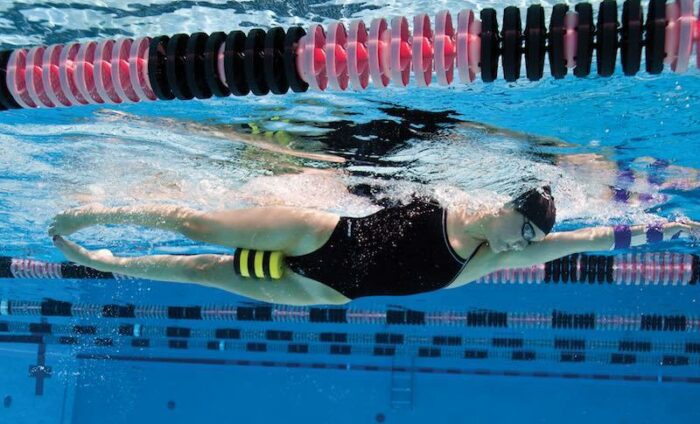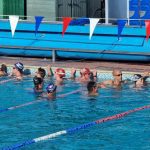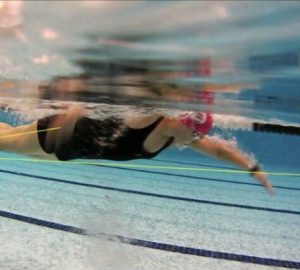
Pull it together
Two training sets from Fiona Ford to help you focus on developing your catch and pull using a pull buoy
Using a pull buoy (a type of float you hold between your legs) in swim training helps you identify how much or how little your legs are bringing to your swim efficiency and speed
equation. If you
swim faster with
the pull buoy
than without,
then you can
reasonably
assume that your
legs are holding you
back in some way.
It may be that they are
sinking too much, that you
are kicking with inefficient technique (eg with too much knee bend rather than with a straighter kicking action
driven from the hips) or maybe a combination of both these factors. The best way to confirm the diagnosis is with a video analysis so you can see for yourself what
is going on. To correct it you need to focus on strengthening your core and improving flexibility and technique.
If you find yourself swimming slower with a pull buoy then the likelihood is that you are gaining some propulsion from your leg kick. Elite pool swimmers could expect up to 15% of their total propulsion from their leg kick, especially when
sprinting.
While it’s not generally a good idea to use the pull buoy as a prop to compensate for poor technique and to help you keep up with faster swimmers, its strategic use can be a valuable addition to your training plan. In particular, by taking the legs out of the equation you can work on increasing propulsion through excellent catch mechanics, an effective pull through (bent arm/high elbow) and finishing your stroke off your thighs rather than at your hips, waist or wide of the body. These sessions will help you focus on the powerhouse of the freestyle stroke – the underwater propulsive phase!
TRAINING SESSIONS
Session 1: Pulling Power (3600m version)
Warmup
200m FS, 4x50m kick, 200m pull, 200m FS
Main set
(Take between 30 and 60 seconds rest between each swim)
400m pull, strong effort (timed swim)
400m FS, strong effort (timed swim)
Are you faster with or without the pull buoy?
300m pull, steady pace. Tap the pull buoy on hand exit during every other length, aiming to complete the stroke through to your thighs. Rotate evenly to both sides 45 degrees.
300m FS, steady pace. Focus on initiating the catch at front of stroke. Notice how this helps you maintain your elbow high and forward as you bring your forearm into the pulling action. Hands should track below shoulders, the elbow is the widest point.
200m pull with ankle band (optional). Move the pull buoy to your knees or ankles rather than thighs to further increase level of difficulty. Maintain 45 degree rotation to both sides using your core and keep feet and ankles in plantar flexion (ie toes pointed). Lightly engage glutes and lower abs.
200m FS with ankle band (optional). Use your core to maintain high leg position behind your body, legs straight from hips and feet and ankles in plantar flexion.
100m pull, maximum effort (timed swim) 100m FS, maximum effort (timed swim) Again compare whether you are faster with or without the pull buoy.
Cool down
200m FS, 4x50m kick, 200m pull, 200m choice of strokes
Session 2: Short and sweet lunchtime special
Warm up
200m FS, 4x25m kick, 200m pull
Main set
(Take between 30 and 60 seconds rest between each swim)
200m pull, strong effort (timed swim)
200m FS, strong effort (timed swim)
Are you faster with or without the pull buoy?
200m pull, steady pace. Tap the pull buoy on hand exit during every other length, aiming to complete the stroke through to your thighs. Rotate evenly to both sides 45 degrees.
200m FS, steady pace. Focus on initiating the catch at front of stroke. Notice how this helps you maintain your elbow high and forward as you bring your forearm into the pulling action. Hands should track below shoulders, the elbow is the widest point.
200m pull with ankle band (optional). Move the pull buoy to your knees or ankles rather than thighs to further increase level of difficulty. Maintain 45 degree rotation to both sides using your core and keep feet and ankles in plantar flexion (ie toes pointed). Lightly engage glutes and lower abs.
200m FS with ankle band (optional). Use your core to maintain high leg position behind your body, legs straight from hips and feet and ankles in plantar flexion.
100m pull, maximum effort (timed swim) 100m FS, maximum effort (timed swim) Again compare whether you are faster with or without the pull buoy.
Cool down
100m choice of strokes
EQUIPMENT REQUIRED
The standard pull buoy is a block of foam somewhat resembling an elongated hourglass. The usual way to use it is to gently squeeze the narrow middle section between your thighs while the broader sections are above and below.
An ankle band is a circular strip of rubber you slip over your feet to prevent you from kicking. A piece of old bicycle innertube can be used instead.
GLOSSARY
Pull – swimming with a pull buoy between your legs. In this article, refers to front crawl.
FS – Freestyle
Kick – swimming with only your legs. Can be done with or without a float. Hands out in front.
Swim Smooth squad training and video analysis sessions
Triathlon Europe provides weekly Swim Smooth squad training in South West London. The squad enjoy training all year round in fabulous indoor and outdoor 33m pools. Fiona offers swim training plans, 1-2-1 video analysis sessions and stroke correction sessions on weekday mornings and weekend Swim Smooth workshops.
Find out more: triathloneurope.com







